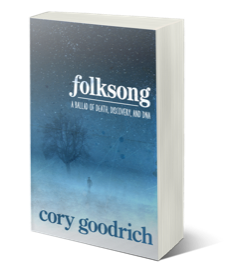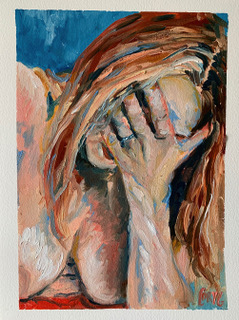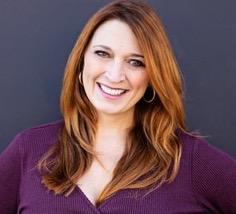Cory Goodrich shares an excerpt from her new memoir, Folksong: A Ballad of Death, Discovery, and DNA
Jeff award-winning actress and musician Cory Goodrich has released her first memoir, Folksong: A Ballad of Death, Discovery, and DNA, published by Finn-Phyllis Press. Folksong is at once a remarkable memoir of love and longing, an emotional ballad of grief and forgiveness, an ode to self-discovery, and a heart-stirring look at the lengths to which a family will go to protect themselves and each other.
CHAPTER TWENTY-ONE
DOWN THE RABBIT HOLE
Are we better off forgetting the details?
I started writing this memoir as a way to process my mother’s death and remember the events surrounding it as they happened before coping mechanisms settled in to destroy the memories in order to protect me. But I haven’t yet been able to write about the actual moment of her death. I’ve been avoiding it. I’ve been avoiding reliving those moments because writing them down will make them real again in my mind and bring me one step closer to a breakdown.
My mother went out of this world like she came in. “The Red Menace,” as she was called by someone along the way—probably my father, made her own choice as to when to go. There was no peaceful exit, even though we were there, holding her hands and singing to her. A timebomb went off and simultaneously destroyed her body and my life. Perhaps that sounds dramatic, but I was simply not prepared for the devastation left in her wake or for the PTSD I experienced, like a soldier having returned from war.
I’ll be honest: I was a little worried about my mental health in the months after she died. I was able to cope better when I was with my brothers and sister. Maybe something about being together again reminded me that, in spite of the years apart and the distance between us, we are still a family. We grew up together and got on each other’s nerves as children (and still do now as adults). When we are together, I remember I am not just an interloper to their happy little trio. Nothing has changed.
But when home alone, or even at home with David and the girls, I still get a little paranoid. Obsessive. Worried that I don’t belong to this family, and that there was a plot to keep the truth from me. To punish me.
I know this is not true, but my brain goes there.
I talk out loud to myself when I am alone making coffee.
I argue with myself. I start to doubt the information I’ve been given from various people, and I make up wild conspiracy theories in my head. I feel just a small crack emerge in my sanity, and I worry that another hit will blow that motherfucker wide open and I will fall down the chasm of insanity like Alice falling down the rabbit hole. Down, down, down, down…
1989, Lancaster, Pennsylvania
I’m twenty-one and I’m doing a national children’s theatre tour of Alice in Wonderland. We are performing at the Fulton Opera House in Lancaster. For some reason, we have a couple of free days after this performance, before our little bus-and-truck production moves on to the next city. Lancaster is only an hour’s drive from Wilmington, so I’ve asked my father, Tom, to come pick me up so we can spend a few days together before my cross-country tour resumes. I arrange for a ticket to be held at the box office under his name, and I tell him I will meet him out front after the show.
I am excited because Daddy has never seen me perform; he saw none of my high school choir concerts or musicals or college plays or cabarets. Nothing. I have only seen him in his world—in Delaware. He has never seen me in mine. I am thrilled that he will not only finally see me perform but he will watch me play Alice, the title character in a really charming musical for young audiences.
I’m nervous during the performance, knowing he is there in the audience, but inside I am beaming. My father is finally seeing me, the authentic me. Not the little girl but a woman, a paid performer. I AM pretty enough to be an actress.
I walk outside of the theatre after the performance, and I see Daddy standing by the box office window. I wonder, as I do every year when I see him again, if I should hug him. I run to him and pause awkwardly, and he says hello. I don’t hug him even though I want to. I wait for him to say something about my performance, and when he doesn’t, I self-consciously ask how he liked the show. “Oh, I didn’t see it. I waited out here.”
It would be cliché to say, “time stopped” or “my heart sank into my stomach,” but those things happened. The moment took my breath away—also cliché, but so true. All those years I spent growing up five-hundred miles away from him in Michigan, all the missed high school concerts, the leads in school plays, the chorus solos—these were the things that defined me. And here was the one chance he had to see—in person—the person I was and the life I had chosen, and he didn’t walk into the building. He was there, but he waited outside.
Sometimes, the things that most define our lives are not the things that happen, but the things that don’t.
Daddy died a year later, so there was never another opportunity, and even if there had been, I doubt he would have walked into the building then either. It plagues me. Did he not understand how important performing was to me? Did he just not care? Was this the ultimate metaphor for my life? My father never saw me perform. My father never saw me. My father never knew me.
And I never knew my father.
“There are things you don’t know about your father, Cory.”
And this is why I worry that another blow to the tiny but delicate crack in my sanity will shatter me wide open.
CHAPTER TWENTY-TWO
PRETTY LIES
October 5, 2017—One day post surgery
I spend all day at the hospital with Jim. Mama drifts in and out of consciousness, but she has been down deep most of the day. She wakes periodically and claws at the tube, but the breathing machine is still doing 95% of the work, pushing air in and out of her lungs. We are frustrated and heartsick, but the nurses and doctors keep repeating flatly that she is not processing the anesthesia in a normal fashion (duh), but it is nothing to worry about—everyone responds differently. I ask what they are giving her for her pain, and they say Tylenol and I lose my shit again. Tylenol doesn’t even begin to alleviate one of my headaches, how could it possibly work on a body cleaved in two? They refuse to give her anything stronger despite my pleas, and I wonder if they think the sheer pain will rouse her from her coma.
At around seven, Jim leaves the hospital to go pick up my sister Susie from the airport. He will take her back to the house in Green Valley, and I will sit vigil with my mother until I am too weary to take any more. I am curled up in the hard chair, playing music for her, trying to focus on my work as producer of a Christmas CD for the charity organization Season of Concern. Peace on Earth and Good Will to Men is about the furthest thing from my mind right now, so I get very little done. I crack open The House at Riverton and read the first page for the third time, but I cannot focus, so back into my bag it goes. I hold my mother’s hand and self-consciously talk to her. Can she hear me? What do I have to say, anyway? Will sappy declarations of love mean anything, or will she wonder who the hell this emotional basket-case child is? But I talk anyway and sing softly to her, feeling foolish but determined to let her know that I am there.
Mark, the day nurse, is in and out of the tiny ICU room, and he smiles and gives me encouragement, but I can see he is frustrated looking at the numbers on my mother’s chart. He has been adjusting levels of various medications throughout the course of the day, but nothing seems to satisfy him. I’ve asked him several times if my mother’s condition is something he’s seen before, and each time he shrugs and says, “I’ve seen it all.” But now that Jim is out of the room, his answer changes. He wants me to know the truth because he knows I know he has been lying.
Mark is short and sturdy; a comfortable man. I’ve also learned he is a musician, so I instinctively trust him. He is the type of man you could lean on, so I do. “Mark, is this normal?” I ask again.
He sighs and sits down in the chair next to me. He takes my hand. “No. It’s not. She is down so deep, and if she doesn’t start breathing on her own soon, you are going to have to make some difficult choices.”
“She doesn’t want this,” I tell him, shaking my head furiously. I can feel her not coming up for air, not breathing on her own because she wants to die, but you can’t exactly pull the plug on an intuition.
“Are there any other options? Is there anything else we can do?”
“Dialysis,” Mark tells me, “but we really don’t want to put her through that. It’s extreme.” He takes my other hand and looks me straight in the eyes. “So, we are going to do everything we can to get her out of this before we go that route.”
Okay…Dialysis—not a good sign.
I thank Mark for his forthrightness and his sympathy. He gives me courage by telling me the truth.
Here’s the thing about the truth: It is usually easier to handle than a lie. When you tell a lie, the person you are telling it to usually knows, somewhere inside. They may not consciously realize it, but an uneasy feeling sets in. They start to doubt themselves and their instincts, and they know something is wrong, even if they can’t quite put a finger on what that something is.
It works that way for me, anyway. I can deal with a hard truth. A pretty lie, on the other hand, is like walking in quicksand, every step pulling me further down and under, just like my mother is down and under in her postoperative coma.
Tell me the truth so I am not basing my life on a lie: Have you guessed my mother’s secret yet?
Cory Goodrich came to Chicago to pursue her dream of acting in 1989. Born in Wilmington, Delaware and raised in Clarkston, Michigan, she’s a Jeff Award-winning best actress for her roles as Mother in Drury Lane Oakbrook’s acclaimed production of Ragtime and as June Carter Cash in the Johnny Cash revue Ring of Fire at Mercury Theater Chicago. A five-time Jeff nominee, Goodrich has performed in productions at the Marriott Theatre in Lincolnshire, Chicago Shakespeare, Theatre at the Center, Ravinia, Candlelight, and Drury Lane. A graduate of Michigan State University, she’s also a singer/songwriter, producer, writer, mother of two, and children’s composer with two award-winning CDs, Hush and Wiggly Toes and a recording artist with original country album W.O.M.A.N. As the recipient of the 2015 Cohen-Grappel Recording Endowment, Goodrich produced Wildwood Flower, a collection of traditional and original folk songs featuring the autoharp. Her latest experimental folk album, produced with The Quiet Regret’s Ethan Deppe, is set to drop in March and features music from her memoir. Visit her website, find her on Facebook, and on Instagram @folksongbook and @corygoodrich.


